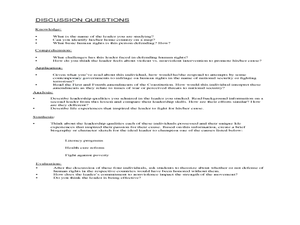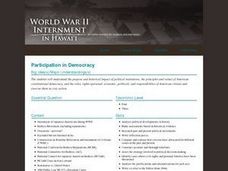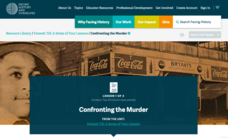Curated OER
Justice in America
Eleventh graders analyze primary sources for evidence of intent and purpose. In this American government instructional activity, 11th graders compose a one-page response explaining their understanding of "justice." Students read and...
Curated OER
U.S. Constitution
Students examine the U.S. Constitution. In this American government lesson, students explore the purpose and significance of the Constitution as they read the provided handouts and complete the provided worksheet.
Curated OER
Significance of Individuals to Defending Human Rights
Eleventh graders examine four different kinds of human rights. In this American Government lesson plan, 11th graders research the assigned human right in their groups. Students create a presentation about this human right to...
Curated OER
The Star Spangled Banner
Fourth graders investigate the importance of The Star Spangled Banner after listening to a teacher explanation of how Francis Scott Key wrote the song. They talk about the battle during the War of 1812 that led to the writing of the...
Curated OER
Voting and US Resident Aliens
Twelfth graders examine the process of voting. In this American Government lesson, 12th graders evaluate the arguments for and against alien voting. Students participate in a debate on voting rights.
Curated OER
Telegram from Senator Joseph McCarthy to President Harry S. Truman
Students research the McCarthy hearings to determine the following: time frame of hearings, how they were broadcast, how the press reacted, and how the American people reacted in light of the Korean Conflict and the Cold War.
Curated OER
With Liberty and Justice for All
High schoolers examine the role of Supreme Court justices. For this judicial branch lesson, students consider the civil rights and civil liberties as they investigate Minersville School District v. Gobitis (1940) and West Virginia State...
Curated OER
The Many Faces of Paul Robeson
Students discuss and construct timelines based on the life of author/performer/Civil Right's activist, Paul Robeson. They view photographs of him at various times in his life and discuss the roles he may have been playing at those times.
Curated OER
Participating in Democracy
Students analyze film clips in class. In this democracy lesson, students identify the differences between civil liberties, democracy and freedom. Students view a video regarding Japanese internment and answer study questions as well as...
Curated OER
Jackie Steals Home
Students read articles relating to Jackie Robinson's breaking of the racial barrier in professional baseball. This leads to a deeper exploration of racism in the United States. They use a variety of worksheets imbedded in this plan to...
Facing History and Ourselves
Emmett Till: Confronting the Murder
The 1955 murder of Emmett Till is often regarded as the catalyst for the Civil Rights Movement of the 20th century. Learn more about the brutal crime—and, as many believe, the miscarriage of justice—that began a national conversation...
Curated OER
Civil Liberties And National Security
Learners experience profiling first-hand through creation of a Class ID, and daily persecution of a selected group of students. They examine the tension between the concern for national security and for the preservation of civil liberties
Curated OER
Foreign War and Domestic Freedom: A Delicate Balancing Act
Students investigate civil liberties in the U.S. They watch and discuss a PowerPoint presentation, conduct research on an event from a timeline, complete a worksheet, take an ideology quiz, and conduct a debate.
Curated OER
Civil Rights
Twelfth graders survey how controversial court cases have changed the viewpoints of civil rights. In this U.S. Government lesson plan, 12th graders work in small groups to prepare summaries of specific court cases, then present...
Curated OER
Martin Luther King
Students examine the contributions made by Martin Luther King Jr. They discuss civil rights, conduct research in small groups, participate in a discrimination simulation, and create a collage.
Curated OER
Teaching With Documents Lesson Plan: Sioux Treaty of 1868
Students study the Sioux and their lives in the Black Hills before 1868. They engage in a wide variety of cross-curricular activities which give them a good understanding of the Sioux culture.
Curated OER
Memorandum Regarding the Enlistment of Navajo Indians
Students examine the Navajo dictionary used by the U.S. military in W.W. II. They role-play Navajo messengers and Marine Corp staff. They research the Battle of Iwo Jima and confirm or discount the claim that Navajos made the victory...
Benjamin Franklin Tercentenary
Classroom Constitutional Convention
Students investigate the eight phrases that comprise the Preamble to the U.S. Constitution to determine its principles and purpose. Their own Constitutional Convention is convened to craft a preamble for their school's governance.
Curated OER
All Access Spotlight: U2
Students listen to songs from the group U2 to examine civil rights issues.
Curated OER
Burial "Rights"
Students, after viewing several segments of the video, "Stories Under the Stones," discuss the pros/cons of separate burial areas for different groups of people. They analyze a series of documents regarding the burial policy of one...
Curated OER
Martin Luther King and Writing as a Tool for Social Change
Students explore writing as an agent for social change. In this Social Studies lesson, students examine the power of writing using Dr. King's Letter from a Birmingham Jail. Students will practice the technique of persuasive writing...
Curated OER
Rights-Minded
Young scholars expand their knowledge and understanding about the civil rights movement by investigating the lives of some of the people who contributed to it.
Curated OER
Why Can't I Vote?
Fourth graders take an unannounced test (failure is expected) and the top scores are rewarded with candy bars. They compare this test to the literacy tests given before 1960 and votes to candybars. They journal their responses.
Curated OER
Government Lesson Plan: Lesson Plan 9
Students examine and compare/contrast the steps of criminal and civil cases. They define key vocabulary terms, develop an outline of a criminal and civil trial, and analyze the differences in standards of proof in legal cases.
Other popular searches
- U.s. American Civics
- Us American Civics
- Chapter 1 American Civics
- Holt American Civics
- American Civics and Activism
- Chapter 2 American Civics
- Civics American Goverment























